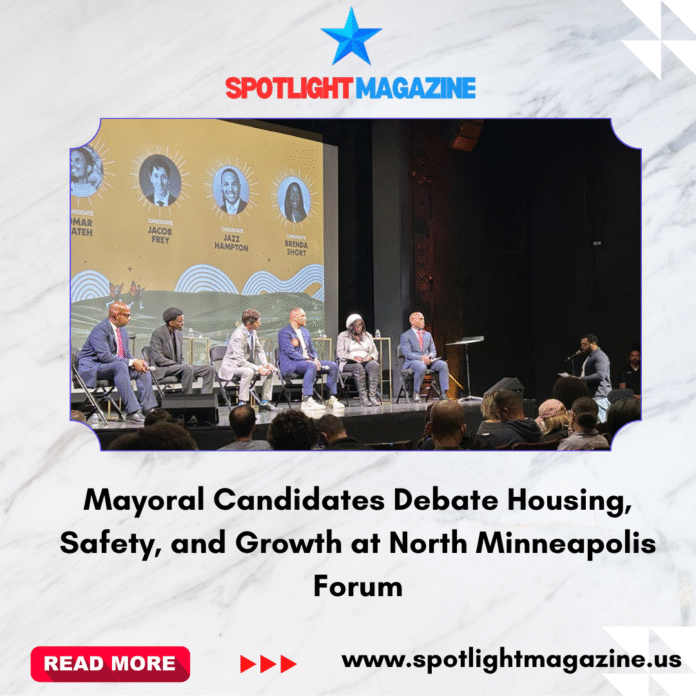The African American Leadership Forum (AALF) hosted a Minneapolis mayoral forum on Wednesday at The Capri Theatre in North Minneapolis, opening with a soulful performance by singer Kennadi Watkins, who sang “Hold On (Change Is Comin’)” by Sounds of Blackness. The event, moderated by academic and activist Dr. Yohuru Williams, featured incumbent Mayor Jacob Frey, Senator Omar Fateh, DeWayne Davis, Brenda Short, and Jazz Hampton.
The forum brought together residents, community leaders, and candidates to discuss issues that directly affect North Minneapolis, including youth services, public safety, affordable housing, homelessness, and economic opportunity. Dera Beevas, AALF’s interim CEO, said the organization focuses on leadership development and policies shaped by community wisdom. Amber Jones, AALF’s managing director of policy impact, urged the community to embrace its collective strength, saying, “The city we see today does not define what it must become. We are not waiting on a single leader to decide our future.”
Housing and homelessness dominated the discussion. Frey highlighted his 4d Affordable Housing Incentive program, which offers property tax reductions to landlords who keep rents low. Fateh pushed for rent stabilization and the Tenant Opportunity to Purchase Act, which would allow tenants the first chance to buy their building if it goes up for sale. Davis said the city should partner with nonprofit and public developers to strengthen neighborhoods that have long suffered disinvestment. He also proposed expanding the homelessness response team and moving it under the city’s Department of Health. Frey noted that the city’s housing-first approach has reduced homelessness but agreed more needs to be done. Fateh added that addressing homelessness should include culturally competent care and accessible treatment services.
Public safety and police accountability were also major topics. When asked about protecting Black residents and addressing youth violence, all candidates said they would support a crime bill targeting hate crimes and police violence. They agreed that youth need more job opportunities and community programs. “These ‘bad’ kids you’re seeing in the media aren’t failing us—it’s us failing them,” Fateh said. He and Hampton both called for diverting more 911 calls to mental health professionals, while Frey emphasized that the city already funds a 24/7 mental health response and invests about $3 million annually in youth recreation. “Do we need to do more? Absolutely,” Frey said. “But the progress is very real.”
With the Minneapolis Police Department under a court-enforceable agreement to reform, Davis said now is the time to embed lasting change. He proposed requiring the city’s public safety commissioner and police chief to develop an annual comprehensive violence prevention plan.
The conversation then shifted to economic development. Short emphasized the need to better inform business owners about city resources like grants and free training programs. “If we want to stay here, we need to work together to stay here,” she said. Fateh agreed that open communication with business owners is essential, recalling a recent meeting with a Black entrepreneur who had to close his shop on Hennepin Avenue due to declining foot traffic. Davis pointed to the Northside Forward plan—a 10-year anti-displacement and growth initiative—as a key opportunity to build economic capacity in the community. He said the city must provide technical support to help local entrepreneurs succeed.
Davis concluded that the economic challenges in North Minneapolis stem from decades of redlining and segregation that excluded Black residents from opportunity. “Those were intentional actions,” he said. “Now we need intentional actions to undo them.”


